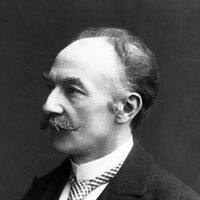
I looked up from my writing
This poem appears at the end of the main body of Hardy’s 1917 volume Moments of Vision (the only thing that succeeds it is a section, distinct in the table of contents for the book, called “Finale”). So we can assume the poem to refer incidentally to the writing of all the preceding poems in the volume, a number of which have to with the Great War, then in its 3rd year, to one consequence of which this poem alludes in its 4th stanza. I have always thought that the Moon’s voice, as given here—as characterized here—is remarkable: slightly mocking in its address, with a note of incredulity. I sense no sympathy, no fellow-feeling, in the “scanning about” the Moon’s done to find the suicide who killed himself by drowning out of sorrow for a son killed in the war—which act provides her with the occasion, in any case, for a somewhat macabre and tasteless pun: he is a “sunken soul.”
Well, yes: he drowned himself. The reference she makes to his “frenzied tattle” makes light, in an odd way, of this suicide’s appalling sublunary ordeal—when viewed from on high, as it is here. The phrasing denies his suffering the dignity we suppose it to deserve (I mean, from a merely “human” point of view). The Oxford English Dictionary confirms that there was never a time when “tattle,” whether as noun or verb, did not imply “gossip,” “idle talk,” “prattling,” “baby-talk,” etc. Calling that “tattle” “frenzied” hardly redeems the aspersion. And isn’t it as if the Moon is “rubbernecking,” looking in on—or trying to look in on—some small human disaster or other, from no more respectable motive than curiosity? No wonder Hardy “shuns her view.” She finds him slightly absurd for doing what he does—writing poetry in a world, then at war, and hardly worth the investment he makes in such a book as Moments of Vision. The Moon suggests that Hardy’s mind is “blinkered”: hood-winked, deceived, blind to what any sane and fit intelligence could see—namely, that nothing human is worth the record, when men show themselves perfectly capable of gassing one another, etc.—oh, phosgene, mustard gas, liquid xylyl bromide tear gas, chlorine, what have you—in an intra-European squabble whose deepest roots lay in competitive colonialism. Incidentally, it is worth pointing out that “Finale,” set apart from the main body of the book, as I’ve indicated, contains two poems. The first is called “The Coming of the End.” The second, titled “Afterwards,” includes a well-known stanza in which Hardy intimates how he would like to be remembered after his own death:
When the hedgehog travels furtively over the lawn,
One may say, “He strove that such innocent creatures should come to no harm,
But he could do little for them; and now he is gone.”




